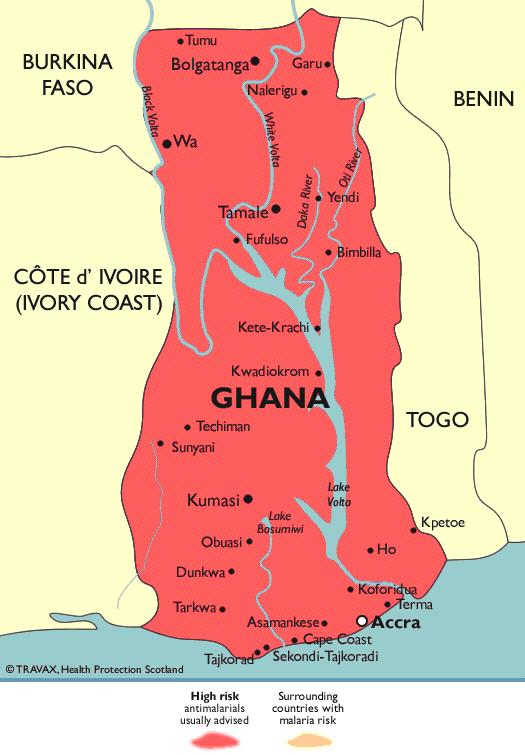Ghana
Official Name Republic of GhanaTotal area 238,533 sq km
Population 174,507,539 (July 2013 est.)
Capital City Accra
Map

Background
Ghana is a country in West Africa. It is bordered by the Ivory Coast, Burkina Faso, Togo, as well as the Gulf of Guinea to the south.
Formerly a British colony, in 1957, Ghana was the first sub-Saharan country in colonial Africa to gain its independence. Ghana is the second largest cocoa producer in the world, and one of the world’s largest gold producers. It is also home to Lake Volta, the largest artificial lake in the world by surface area.
Economy
During the last quarter of century, Ghana’s economy has been supported by a competitive business environment, good management and continued decline in poverty levels. The country is well-endowed with natural resources. The production of gold and cocoa, as well as individual remittances, are major sources of foreign exchange.
Agriculture accounts for approximately a quarter of the country’s GDP and employs more than half of Ghana’s workforce. Offshore oil production is expected to boost economic growth.
Health
Ghana has a universal health care system and most of the health care is provided by the government. For every 100,000 people, there are about 15 physicians and 93 nurses.
Urban facilities are usually well served; however, rural areas often have no modern health care. Patients in rural areas will either rely on traditional African medicine, or have to travel great distances to receive such health care.
Major infectious diseases:
Food or waterborne diseases: bacterial and protozoal diarrhea, hepatitis A, and typhoid fever
Vectorborne diseases: malaria
Water contact disease: schistosomiasis
Respiratory disease: meningococcal meningitis
Malaria Status
About 25 million people (the entire population) are at risk of malaria, even though transmission rates are lower in some urban areas.
According to Ghana’s health facility data, malaria is the leading cause for morbidity, and accounts for 36% of hospital admissions and 33% of deaths in children under five years of age. Transmission occurs year round with seasonal variations. Around 3.1 and 3.5 million cases of clinical malaria are reported each year, with 900,000 of the cases being children under age five.
SEARCH
TESTIMONIALS
-
The African Development Bank is pleased to invite you to a presentation from InRaD (Innovative Research and Development Corporation) on their latest innovation to fight m ...Egyptian Innovation: A Green Cure for Malaria
-
Field trail using Sunlight activated Formulated Extract (SAFE) to target and control Mosquito larvae (The Vector of malaria and filarial diseases); Novel Egyptian Technology for mosquito control.Sudan Testimonial
-
In this regard, Her Excellency would like to express her appreciation for your endeavors, which contribute in developing the relations with the Nile basin countries speci ..."H.E." Fayza Abu El Naga
-
On behalf of the Government conclusion, I find the Egyptian extract extremely efficient in killing mosquito larvae which can ingest particles of this extract and its stri ...Uganda Virus Research Institution
-
Earlier this morning, we had a very good meeting with two of our compatriots, Dr. Walid A. Ali and Dr. Tarek A. El Tayeb of the innovative Research and Development (INRad ...Federal Democratic Republic of Ethiopia Ministry of Health
